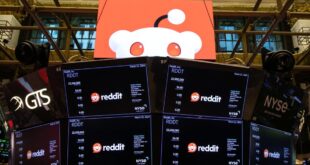(Bloomberg) — China’s central bank moved to support markets just as data showed the economy expanding the least in six quarters, signaling the government’s intent to continue a stimulus push to draw a line under the slowdown.
Most Read from Bloomberg
The People’s Bank of China disclosed more details of its measures to boost capital markets minutes after authorities released figures showing China’s slowdown deepened in the third quarter. At a separate event in Beijing, PBOC Governor Pan Gongsheng flagged the real estate and stock markets as key challenges in the economy that require targeted policy support.
Coordinated or not, the moves by the PBOC and its governor appeared to bolster hope that Beijing would do what it takes to ensure the country reaches its 2024 growth target of around 5%. Although the expansion was slower than in previous quarters, better-than-expected data for September offered tentative signs the economy has bottomed out.
The probability of China achieving its growth goal “now looks very high,” said Jacqueline Rong, chief China economist at BNP Paribas SA. “Only a mild rebound in the fourth quarter will get the job done.”
China’s benchmark CSI 300 Index of onshore stocks rebounded from earlier losses to close up 3.6% higher, after the central bank kicked off a re-lending facility for listed companies and major shareholders to buy back shares. Stocks also got a boost from President Xi Jinping’s call for efforts to achieve the year’s economic goals and financial support for technology, with chipmaker Semiconductor Manufacturing International Corp. gaining 20%.
What Bloomberg Economics Says…
“Given the force and breadth of the policy response in recent weeks, the economy has likely bottomed out. The government will probably now concentrate on implementation, with a particular focus on ensuring local officials deliver fiscal spending that’s been budgeted for the year.”
— Chang Shu and Eric Zhu
Read the full note here.
The Friday data painted a mixed economic picture for the last quarter.
Gross domestic product increased 4.6% in the July-to-September period from a year prior, data released by the National Bureau of Statistics showed, bringing growth for the first nine months to 4.8% — the lower end of China’s annual growth goal.
Things appeared to take a turn for the better during the last stretch of the period, with retail sales accelerating in September to grow 3.2% after expanding 2.1% the prior month.
The better-than-expected consumption gauge likely received a boost from government subsidies for upgrading consumer goods. Home appliances saw a 21% surge in sales from a year ago, picking up from a 3% gain in the previous month. Increased subsidies for car purchases also paid off, with auto sales snapping a six-month declining streak.
“The economy will perform better in the fourth quarter given the new stimulus measures,” said Larry Hu, head of China economics at Macquarie Group Ltd.
The appliance and goods trade-in program is part of China’s stimulus measures including interest rate cuts, with the elite Politburo led by Xi supercharging the push with a vow to stabilize the beleaguered real estate sector.
The slate of measures prompted a historic stock rally and led banks including Goldman Sachs Group Inc. to upgrade their forecasts for China’s growth. But skepticism has grown over whether authorities are willing to deploy greater fiscal firepower to turn around the economy and markets.
Investors now expect Chinese lawmakers to approve additional budget or debt sales to fund public spending in a meeting as soon as this month after authorities promised fiscal support.
At a Beijing forum, PBOC’s Pan reiterated that the monetary authority will make a reasonable rebound in prices a key policy consideration. A broad measure of prices fell for a sixth quarter, data showed Friday, extending the economy’s deflation streak, the longest since 1999.
Apart from retail sales, industrial production and fixed-asset investment also picked up in September, and jobless rate fell to 5.1%, the lowest since June.
New home prices, however, fell for a 16th month, dropping at almost the same pace as in August.
“There is still a lack of stabilization in the property market yet, indeed indicating the needs for continued policy easing,” said Xiaojia Zhi, chief China economist at Credit Agricole.
The NBS said there’s reason for caution despite improvements in the main indicators as the stimulus measures are rolled out, citing an “increasingly complex and grim” external environment and a need to strengthen the economy’s foundation.
Data released before Friday underscored those challenges. Exports in September slowed sharply, curbing a trade rebound that has been a highlight for the economy. Deflationary pressures continued to build, with consumer prices still weak and factory gate prices falling for 24 straight months.
Economists have urged Beijing to boost consumer spending to avoid a spiral of falling prices, which could risk a self-reinforcing cycle of declining spending, shrinking business revenues and job losses. But authorities have shown little urgency to ramp up consumption with any direct stimulus or large-scale handouts, which Xi has long resisted due to concerns over what he calls “welfarism.”
What’s Wrong With China’s Economy? What’s Xi Doing?: QuickTake
China has so far appeared to be focusing its fiscal policy on reining in local debt risks, with Finance Minister Lan Fo’an promising what he described would be the biggest effort in years to bring hidden debt onto local governments’ balance sheet.
The strategy is aimed at easing the debt servicing burden for the authorities by bringing down interest costs and delaying loan repayment. This frees up cash and gives local governments greater scope to drive economic growth.
“The improvement in the growth momentum of the key monthly indicators may provide some comfort to policymakers,” said Louis Kuijs, chief Asia-Pacific economist at S&P Global Ratings. “Yet I don’t think that one month of slightly better activity data can justify reducing policy support to growth, especially not at a time when deflation risks have increased.”
–With assistance from Tian Chen, James Mayger and Jing Li.
(Updates with market close and Xi Jinping comments in fifth paragraph)
Most Read from Bloomberg Businessweek
©2024 Bloomberg L.P.
Source link
 meganwoolsey Home
meganwoolsey Home

